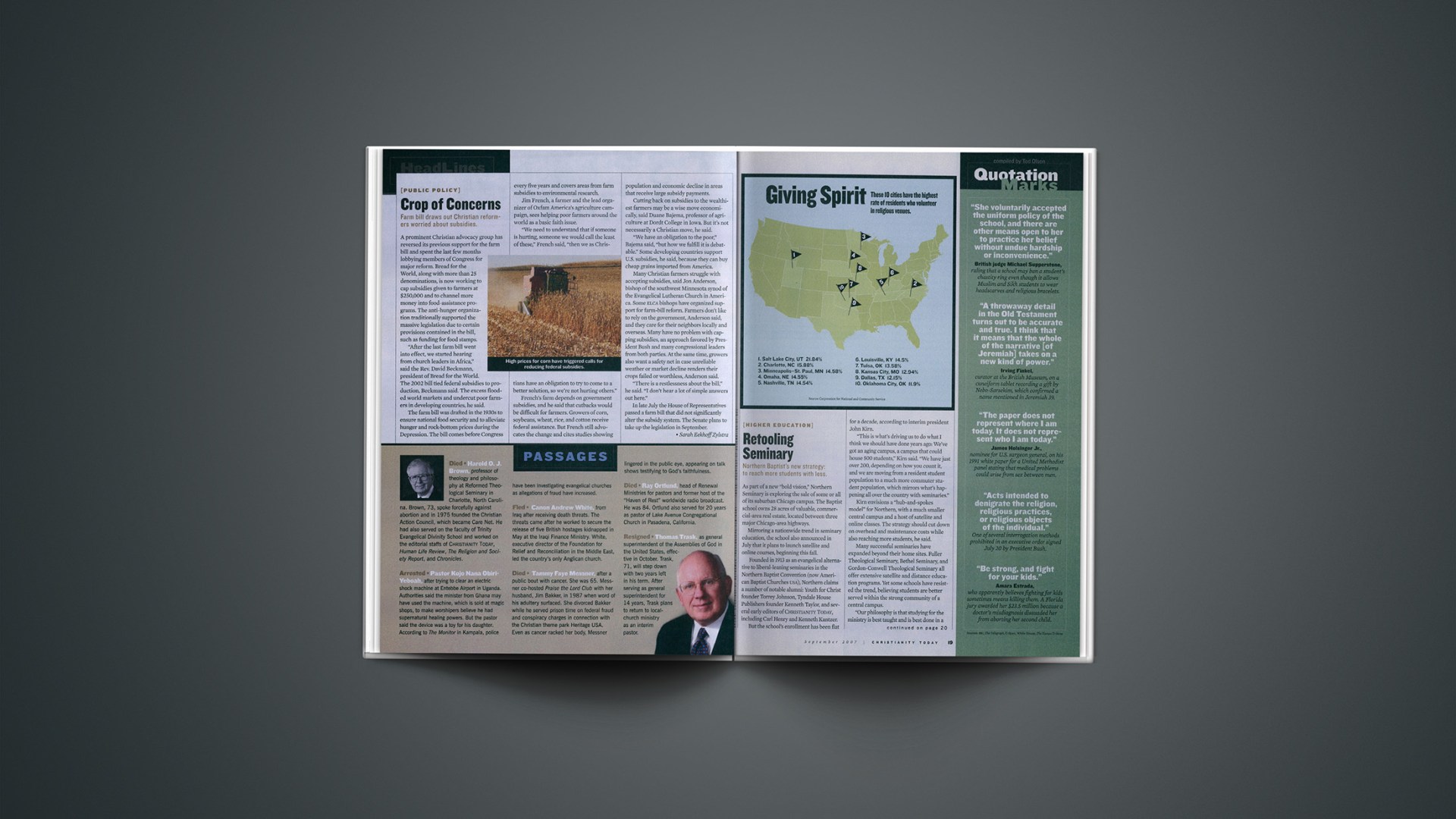A prominent Christian advocacy group has reversed its previous support for the farm bill and spent the last few months lobbying members of Congress for major reform. Bread for the World, along with more than 25 denominations, is now working to cap subsidies given to farmers at $250,000 and to channel more money into food-assistance programs. The anti-hunger organization traditionally supported the massive legislation due to certain provisions contained in the bill, such as funding for food stamps.
"After the last farm bill went into effect, we started hearing from church leaders in Africa," said the Rev. David Beckmann, president of Bread for the World. The 2002 bill tied federal subsidies to production, Beckmann said. The excess flooded world markets and undercut poor farmers in developing countries, he said.
The farm bill was drafted in the 1930s to ensure national food security and to alleviate hunger and rock-bottom prices during the Depression. The bill comes before Congress every five years and covers areas from farm subsidies to environmental research.
Jim French, a farmer and the lead organizer of Oxfam America's agriculture campaign, sees helping poor farmers around the world as a basic faith issue.
"We need to understand that if someone is hurting, someone we would call the least of these," French said, "then we as Christians have an obligation to try to come to a better solution, so we're not hurting others."
French's farm depends on government subsidies, and he said that cutbacks would be difficult for farmers. Growers of corn, soybeans, wheat, rice, and cotton receive federal assistance. But French still advocates the change and cites studies showing population and economic decline in areas that receive large subsidy payments.
Cutting back on subsidies to the wealthiest farmers may be a wise move economically, said Duane Bajema, professor of agriculture at Dordt College in Iowa. But it's not necessarily a Christian move, he said.
"We have an obligation to the poor," Bajema said, "but how we fulfill it is debatable." Some developing countries support U.S. subsidies, he said, because they can buy cheap grains imported from America.
Many Christian farmers struggle with accepting subsidies, said Jon Anderson, bishop of the southwest Minnesota synod of the Evangelical Lutheran Church in America. Some ELCA bishops have organized support for farm-bill reform. Farmers don't like to rely on the government, Anderson said, and they care for their neighbors locally and overseas. Many have no problem with capping subsidies, an approach favored by President Bush and many congressional leaders from both parties. At the same time, growers also want a safety net in case unreliable weather or market decline renders their crops failed or worthless, Anderson said.
"There is a restlessness about the bill," he said. "I don't hear a lot of simple answers out here."
In late July the House of Representatives passed a farm bill that did not significantly alter the subsidy system. The Senate plans to take up the legislation in September.
Copyright © 2007 Christianity Today. Click for reprint information.
Related Elsewhere:
The U.S. House of Representatives passed the farm bill on July 27.
Bread for the World's Seeds of Change campaign has focused on farm bill reform.
The USDA has a list of proposals made to the 2007 farm bill.
Related articles include:
Baptists, other Christian leaders push for reform in farm bill | Baptists and other Christian groups are asking Congress to seize an opportunity to reform the way the government relates to farmers—for the sake of the poor in the United States and around the globe, they say. (Associated Baptist Press)
Stated Clerk joins in call for farm bill that 'strengthens rural communities' | Presbyterian Church (U.S.A.) General Assembly Stated Clerk the Rev. Clifton Kirkpatrick joined a number of religious leaders July 17 in a letter sent to the speaker of the United States House of Representatives pressing for a reform-minded farm bill. (Presbyterian News Service)
The Farm Bill and the Common Good | Last Friday the House passed a 741-page Farm Bill, largely keeping intact the existing system of subsidies (God's Politics)










